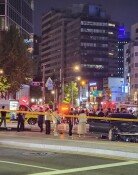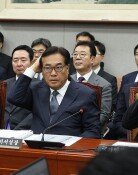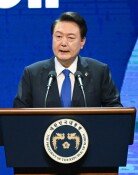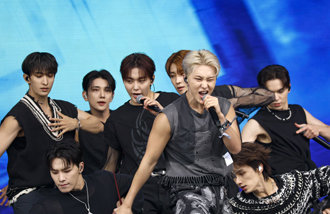Maligned head of top tech school speaks on possible dismissal
Maligned head of top tech school speaks on possible dismissal
Posted July. 16, 2012 23:54,
The president of the Korea Advanced Institute of Science and Technology, or KAIST, one of the country`s top two tech schools, is facing pressure to resign after once being considered a symbol of university education reform.
Suh Nam-pyo spoke to The Dong-A Ilbo at his residence in Daejeon on Monday, ahead of the KAIST board meeting Friday, which will discuss termination of his contract.
He claimed that a bill on his termination was submitted to the board due to opposition to his reform drive by a group of professors and the Education, Science and Technology Ministry.
While pressuring me to resign more than 30 times over the past two years, they`ve never even given me a chance to tell the board about the schools future or education, he said in expressing regret.
Here are key excerpts from the exclusive interview.
Dong-A: Why do you think the bill to dismiss you was submitted to the board?
Suh: The Education, Science and Technology Ministry wanted to force me out. They might hate me because I secured budget for the school without resorting to the minister or senior officials, and I wasn`t obedient (to senior government officials). I thought I wouldn`t be able to carry out my mission if I blindly followed established practice in officialdom. This is the reason the ministry objected to the renewal of my contract two years ago.
Dong-A: Many professors at the school also objected to the renewal of your contract.
Suh: Following the renewal of my term, a person who is highly cooperative with the Education Ministry was elected chairman of the KAIST board. The schools council of professors also sensed a change in the mood, and so launched a campaign to oust me. Many people have grown uncomfortable since I joined the university. Toughened rules on the tenure system have made the lives of certain professors who want to keep their privileges more difficult. The professors who are spearheading the campaign for my dismissal, including the head of the professors council, are those who`ve often attended elections for the KAIST presidency.
Dong-A: What do you mean by privileges for professors?
Suh: Certain KAIST professors have privileges, a sense of authority and a cartel that is stronger than one would think. They collude based on their common academic background, places of birth and past affiliations, and ruthlessly attack by raising groundless suspicions as if they have immunity (i.e. the claim that Suh deprived a professor of a patent right. A police investigation found that this accusation was groundless). If one suspicion is addressed, they raise another (accusations of special favors given in a professors appointment or financial losses). None of them proved to be true.
Dong-A: Rumors had it that you would serve only two more years when your term was renewed in 2010.
Suh: When my term was renewed, certain board members and professors claimed that they would vote for me or support school affairs if I stayed just two years (the official term is four years). I rejected their offers, and my term was renewed in a 16-2 vote. The education minister sent me a letter of appointment for a four-year term.
Dong-A: You have reportedly demanded that they rather fire you this time.
Suh: Only when the KAIST president can do his job in a stable environment can the university have a good president and competent professors. I am urging them to fire me instead because I want to be the last victim of KAIST culture, in which they recklessly force out the president despite no legal grounds.
Dong-A: You were under pressure for dismissal in the U.S. as well. Are you overreacting to such demand only in Korea?
Suh: I was under pressure for dismissal while serving as vice chairman of the National Science Foundation and the dean of the mechanical engineering college at MIT in the U.S. But they didn`t attack me by making up something that didn`t exist as they do in Korea. That is impossible to do in the U.S. because fabricating things warrants severe punishment. I`m trying to defend myself because they`ve rejected the reform drive by making things up.
Dong-A: Is this perhaps because of your lack of communication with members of the university?
Suh: Communication is not unilateral. I think, if we like what is discussed, it will constitute communication even if we meet just once. Otherwise, it will be lack of communication even if we meet several times. Even a university president cannot forcefully create a venue for communication. I proposed a committee for communication that the professors council repeatedly rejected. As for me suing professors, I had no other choice but to do so because they denied a probe by the in-house committee to confirm authenticity of research, and only raised and exaggerated suspicions. Even so, the board is demanding my resignation just because it is controversial, while turning a blind eye to such a reality.
Dong-A: What are your achievements at KAIST?
Suh: Over the past six years, KAIST rose to the 60ths from the 200ths in the global university rankings. The engineering college ranked in the 20ths. Donations to the university increased from 5.1 billion won (4.4 million U.S. dollars) before my term to some 170 billion won (148 million dollars). With the number of young professors being recruited en masse, the school will achieve explosive growth in five years.
Dong-A: There have been many problems as well as achievements.
Suh: I deeply feel sorry for the student suicides. Some of the students who were recruited through the college admissions officer program from ordinary high schools (not science high schools for gifted students) failed to adapt to KAIST life. We should`ve given extra consideration to them after their admission.
Dong-A: Do you regret your life in Korea since you face possible dismissal?
Suh: Since I`ve worked here for six years, I have no regrets. I`ve realized my dream to work in my motherland. While working in the U.S., I was offered to lead the Korea Institute of Science and Technology and Pohang University of Science and Technology, but lost both chances due to my work with the U.S. government. I`m grateful to the Korean people. Were it not for their support, I could`ve hardly survived here for more than two years. If the board confirms the termination of my employment contract, I will write a book on advancing higher education in Korea over the 90-day grace period.
mhjee@donga.com







